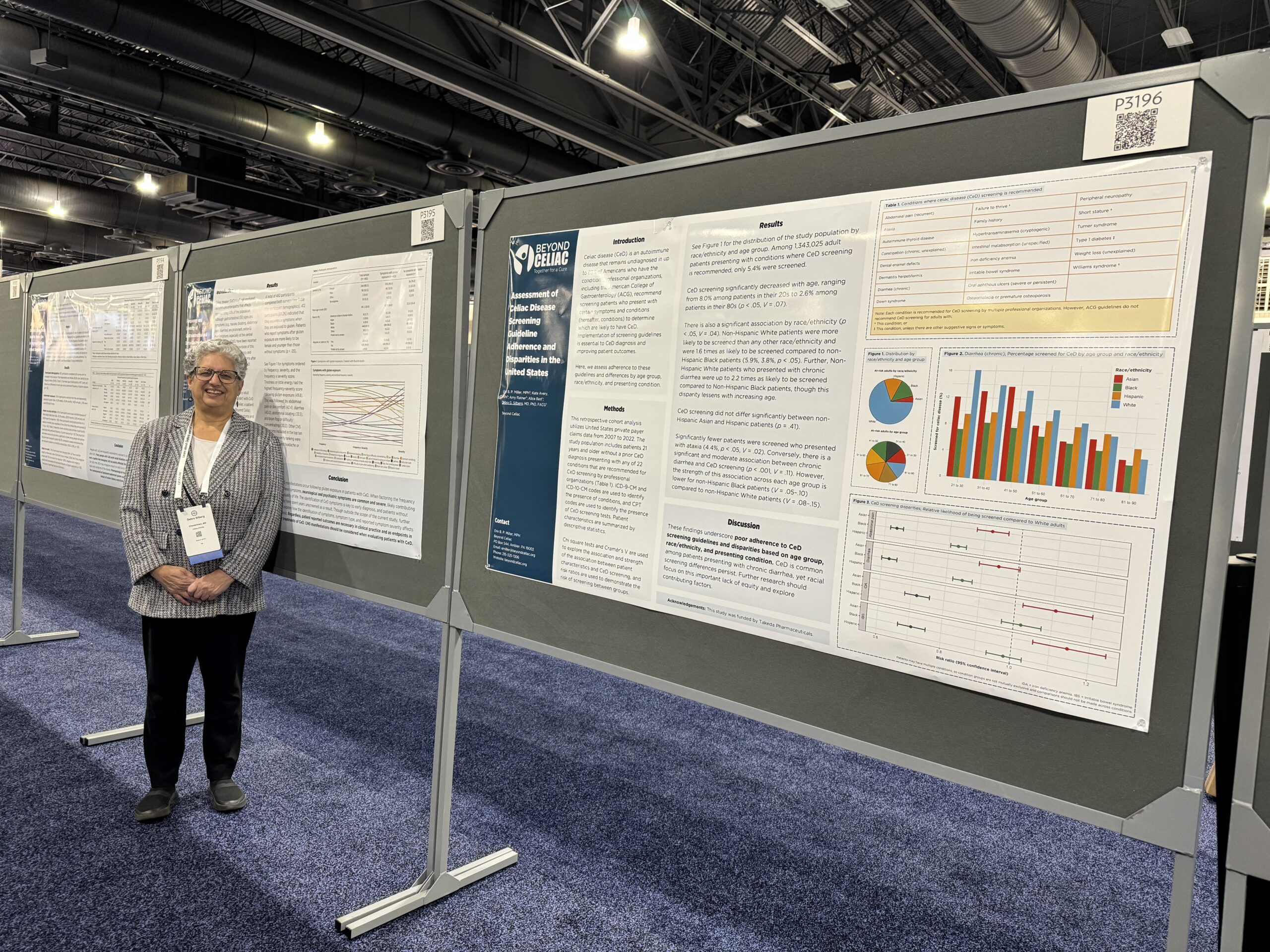Additional studies presented at ACG point to neurological symptoms, frequent gluten exposure and impact on social activities and work

By Amy Ratner, director of scientific affairs
Guidelines for testing people for celiac disease based on related symptoms are not being followed by healthcare providers, according to evidence presented by Beyond Celiac at the recent American College of Gastroenterology (ACG) annual scientific meeting.
The findings also showed disparities in celiac disease screening based on age, race, ethnicity and the presenting condition.
Deb Silberg, MD, Beyond Celiac chief scientific officer, presented the screening evidence, which was based on an analysis of a large database of private insurance medical claims. Guidelines by professional medical organizations recommend testing for celiac disease when someone has any of 22 conditions.
Silberg also presented survey data from Go Beyond Celiac, the Beyond Celiac celiac disease patient registry, which showed neurological and psychiatric symptoms in celiac disease are common and severe, impacting quality of life.
A second survey from Go Beyond Celiac about life after celiac disease diagnosis found that people with celiac disease are frequently exposed to gluten despite their best efforts to avoid it. Many adults with celiac disease reported that they avoid social situations due to the gluten-free diet. And more than one in four said managing the diet has poorly affected their work.
Beyond Celiac analyzed private payer insurance claims from 2007 to 2022 to determine whether patients with any of the recommended conditions went on to get tested for celiac disease. Among more than 1.3 million adults with any one of these conditions, only about 5 percent were screened. Non-Hispanic white people were screened more often than any other race and were more than one and half times were likely to be screened than non-Hispanic Black people.
Celiac disease is common in those who have chronic diarrhea, but differences in screening with this condition based on race persist, the analysis found. Screening also decreased based on a person’s age.
The data analysis study, which was funded by Takeda Pharmaceuticals, calls for more research into healthcare disparity in celiac disease screening and contributing factors.
In an online survey of about 460 adults with celiac disease who participate in the registry, nearly 90 percent reported that they experience symptoms when they are exposed to gluten. Tiredness and little energy had the highest rate of frequency and severity, with nearly 50 percent of respondents reporting these conditions.
Abdominal pain or discomfort followed with about 42 percent, diarrhea with 40 percent, bloating with 34 percent and brain fog or difficulty concentrating, with 30 percent.
Those reporting symptoms were more likely to be female and younger than those who did not report symptoms.
Nearly 400 adults with celiac disease filled out the registry survey about accidental gluten exposure, frequency of avoiding social situations due to the gluten-free diet and the impact managing the celiac disease has on work.
Most reported being exposed to gluten monthly, at about 21 percent. About 15 percent reported they get exposed once a year, while 14 percent said weekly, nearly 4 percent never and about 3 percent daily. In addition, nearly 44 percent said they don’t know how often they are exposed.
Most avoided social activities monthly, at about 29 percent, followed by weekly at about 26 percent, annually nearly 13 percent and daily about 5 percent. Twenty six percent said they never avoid social activities because of the gluten-free diet.
Avoiding social activities weekly or monthly was not related to how often survey participants believed they were exposed to gluten. However, those who didn’t believe they were ever exposed to gluten were significantly more likely to never avoid social situations.
About 43 percent of those taking the survey said managing celiac disease had no impact on their work, while about 29 percent reported a negative impact and about 8 percent a positive impact. The negative impact on work was associated with perceived frequency of gluten exposure.
A drug to treat celiac disease is needed to prevent the consequences of persistently being inadvertently exposed to gluten and to reduce the negative impact of the severe restrictions of the gluten-free diet, the survey study concluded.
The ACG is a professional organization focused on advancing gastroenterology and improving patient care.
Opt-in to stay up-to-date on the latest news.
Yes, I want to advance research No, I'd prefer not to